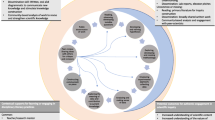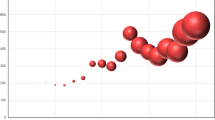Abstract
The present article raises a counterpoint to rethink about the state of scientific research amidst increasing pressure of academic publishing, growing disenchantment with scientific methods, and the issue of replicability of research findings around the world. The article discusses the major issues that upset the present-day academic publishing, along with highlighting the ingredients of scientific research. With increasing commercialization of education and human capital issues in science, linking of research output with academic hiring, institutional ranking, and funding has been discussed with potential implications. Based on previous researches, the current paper offers a matrix of researcher’s dilemma to understand the issue of career vs. knowledge orientation among researchers within the temporal choice of the dissemination of scientific ideas. The article also presents a roadmap for developing research orientation among kids with a vision of developing a culture of research since an early age and questions if the research has the potential to emerge as “the fifth R” after reading, writing, arithmetic, and programming.

Similar content being viewed by others
Notes
As on June 7, 2019
References
Achinstein, P. (2001). The book of evidence. Oxford: Oxford University Press.
Al′tshuller, G. S., Al′tov, G., Shulyak, L., Dronova, N., & Urmanchev, U. (1996). And suddenly the inventor appeared: TRIZ, the theory of inventive problem solving. Worcester, MA: Technical Innovation Center.
Bahr, E. (2007). Weimar on the Pacific: German exile culture in Los Angeles and the crisis of modernism. Berkeley: University of California Press.
Baird, K. (2012). Trapped in mediocrity: why our schools aren’t world-class and what we can do about it. Lanham: Rowman & Littlefield Publishers.
Bartsch, R. A., & Cobern, K. M. (2003). Effectiveness of PowerPoint presentations in lectures. Computers & Education, 41(1), 77–86.
Bavdekar, S. B., & Tullu, M. S. (2016). Research publications for academic career advancement: an idea whose time has come. But is this the right way? Journal of Postgraduate Medicine, 62(1), 1–3.
Bhullar, S. S., Nangia, V. K., & Batish, A. in press(2019). The impact of academia-industry collaboration on core academic activities: assessing the latent dimensions. Technological Forecasting and Social Change, 145, 1–11. https://doi.org/10.1016/j.techfore.2019.04.021.
Bila, J. (2018). YouTube is causing stress and sexualization in young children. Retrieved May 25, 2019, from https://www.cnbc.com/2018/02/13/youtube-is-causing-stress-and-sexualization-in-young-children.html. Accessed 4 June 2019.
Blaikie, N. (2007). Approaches to social enquiry (2nd ed.). Cambridge: Polity Press.
Bobtcheff, C., Bolte, J., & Mariotti, T. (2016). Researcher’s dilemma. The Review of Economic Studies, 84(3), 969–1014.
Bogart, L. (1962). The Researcher’s dilemma. Journal of Marketing, 26(1), 6–11.
Booth, C. (2009). Informing innovation: tracking student interest in emerging library technologies at Ohio University. Chicago: Association of College and Research Libraries, American Library Association.
Boyer, E. L., Braxton, J. M., Ream, T. C., & Moser, E. (2015). Scholarship reconsidered: priorities of the professoriate, expanded edition. New York: Jossey-Bass.
Campaign for Social Science. (2018). Positive Prospects: careers for social science graduates and why number and data skills matter. London: Sage Publications.
Cantore, S., & Passmore, J. (2012). Top business psychology models: 50 transforming ideas for leaders, consultants, and coaches. London: Kogan Page.
Caplan, B. D. (2018). The case against education: why our education system is a waste of time and money. Oxford: Princeton University Press.
Chalmers, I., Hedges, L. V., & Cooper, H. (2002). A brief history of research synthesis. Evaluation & the Health Professions, 25(1), 12–37.
Chu, H., & Ke, Q. (2017). Research methods: what’s in the name? Library & Information Science Research, 39(4), 284–294.
Ciarli, T., & Ràfols, I. (2019). The relation between research priorities and societal demands: the case of rice. Research Policy, 48(4), 949–967.
Clarivate Analytics. (2017). It’s time to get the facts. Retrieved from https://clarivate.com/wp-content/uploads/2017/05/d6b7faae-3cc2-4186-8985-a6ecc8cce1ee_Crv_WoS_Upsell_Factbook_A4_FA_LR_edits.pdf. Accessed 15 Oct 2018.
D’Ippolito, B., & Rüling, C.-C. (2019). Research collaboration in large scale research infrastructures: collaboration types and policy implications. Research Policy, 48(5), 1282–1296.
Dahlstrom, M. F. (2014). Using narratives and storytelling to communicate science with non-expert audiences. Proceedings of the National Academy of Sciences of the United States of America, 111(4), 13614–13620.
Denzin, N. K., & Lincoln, Y. S. (2005). The SAGE handbook of qualitative research. Thousand Oaks, California: Sage Publications.
Douglas, H. (2014). Pure science and the problem of progress. Studies in History and Philosophy of Science, 46, 55–63.
Feist, G. J. (1997). Quantity, quality, and depth of research as influences on scientific eminence: is quantity most important? Creativity Research Journal, 10(4), 325–335.
Feyerabend, P. (1993). Against method (3rd ed.). London: Verso.
Gazzaley, A., & Rosen, L. D. (2016). The distracted mind: ancient brains in a high-tech world. Cambridge: MIT Press.
Gehlert, S. (2013). Turning disciplinary knowledge into solutions. Journal of Adolescent Health, 52(5), S98–S102.
Gigerenzer, G., Todd, P. M., & ABC Research Group. (1999). Simple heuristics that make us smart. Oxford: Oxford University Press.
Glick, M. (2016). Publish and perish. The Journal of the American Dental Association, 147(6), 385–387.
Gould, J. (2015). How to build a better PhD. Nature, 528(7580), 22–25.
Gould, J., & Kimlicka, L. (2014). How to get published in high-impact journals. Retrieved June 4, 2019, from http://blogs.nature.com/naturejobs/2014/06/06/how-to-get-published-in-high-impact-journals-an-essential-guide/. Accessed 4 June 2019.
Grech, V. (2019). Write a scientific paper (WASP): an overview of differences in styles between the sciences and the humanities. Early Human Development, 129, 96–99. https://doi.org/10.1016/j.earlhumdev.2018.12.008.
Green, M. C. (2004). Storytelling in teaching. APS Observer, 17(4). Retrieved from https://www.psychologicalscience.org/observer/storytelling-in-teaching. Accessed 4 June 2019.
Greenberg, D. S. (2007). Science for sale: the perils, rewards, and delusions of campus capitalism. Chicago: University of Chicago Press.
Grove, J. (2015). Social sciences and humanities faculties “to close” in Japan after ministerial intervention. Retrieved July 14, 2018, from https://www.timeshighereducation.com/news/social-sciences-and-humanities-faculties-close-japan-after-ministerial-intervention. Accessed 28 Nov 2018.
Guénon, R. (2001). Man and his becoming according to the Vedānta (3rd ed.). Hillsdale: Sphia Perennis.
Harari, Y. (2014). Sapiens: a brief history of humankind. New York: Vintage.
Helskog, G. H. (2019). Philosophising the Dialogos way towards wisdom in education: between critical thinking and spiritual contemplation. London: Routledge.
Hilliam, R. (2005). Galileo Galilei: father of modern science. New York: Rosen Pub. Group.
Hockley, J., Froggatt, K., & Heimerl, K. (2012). Participatory research in palliative care: actions and reflections. Oxford: Oxford University Press.
Hoffman, J. I. E. (2019). Hypothesis testing: the null hypothesis, significance and type I error. In Basic biostatistics for medical and biomedical practitioners (pp. 159–171).
Holmes, B. (2018). Hey, teacher! Leave those kids alone. New Scientist, 240(3202), 42–43.
Huang, L. S. (2010). Academic communication skills: conversation strategies for international graduate students. Lanham: University Press of America.
Iorns, E. (2013a). Research 2.0.1: the future of research funding. Retrieved June 3, 2019, from http://blogs.nature.com/soapboxscience/2013/06/12/research-2-0-1-the-future-of-research-funding. Accessed 23 May 2019.
Iorns, E. (2013b). Research 2.0.2: how research is conducted. Retrieved June 3, 2019, from http://blogs.nature.com/soapboxscience/2013/06/13/research-2-0-2-how-research-is-conducted. Accessed 23 May 2019.
Kastner, S., & Knight, R. T. (2017). Bringing kids into the scientific review process. Neuron, 93(1), 12–14.
Kerlinger, F. N. (1986). Foundations of behavioral research. New York: Holt, Rinehart and Winston.
Kuhl, D. (1989). Children and adults as intuitive scientists. Psychological Review, 96(4), 674–689.
Kuhn, T. S., & Hacking, I. (2012). The structure of scientific revolutions. Chicago: University of Chicago Press.
Lester, J. D. (2015). Writing research papers: a complete guide. New Delhi: Pearson.
Link, J. M. (2015). Publish or perish …but where? What is the value of impact factors? Nuclear Medicine and Biology, 42(5), 426–427.
Liu, L., Wang, Y., Sinatra, R., Giles, C. L., Song, C., & Wang, D. (2018). Hot streaks in artistic, cultural, and scientific careers. Nature, 559(7714), 396–399.
Lundin, R. A. (2014). Changing contexts for the Scandinavian Journal of Management: publish and perish? Scandinavian Journal of Management, 30(3), 263–265.
Molassiotis, A., McCarthy, A., Charalambous, A., Gibson, F., Lopez, V., & Beaver, K. in press(2019). Common reasons why an academic paper is rejected: views from the editors. European Journal of Oncology Nursing, 40, v–vi. https://doi.org/10.1016/j.ejon.2019.05.002.
Nature. (2019). Being a PhD student shouldn’t be bad for your health. Nature, 569(7756), 307–307.
Negash, M., Lemma, T. T., & Samkin, G. (2019). Factors impacting accounting research output in developing countries: an exploratory study. The British Accounting Review, 51(2), 170–192.
Nerlich, B., & Clarke, D. (2010). Cognitive linguistics and the history of linguistics. In D. Geeraerts & H. Cuyckens (Eds.), The Oxford handbook of cognitive linguistics (pp. 589–610). Oxford: Oxford University Press.
OECD. (2001). What schools for the future? Paris: OECD.
Orduna-Malea, E., Ayllón, J. M., Martín-Martín, A., & Delgado López-Cózar, E. (2015). Methods for estimating the size of Google Scholar. Scientometrics, 104(3), 931–949.
Otto, S. L. (2012). America’s science problem. Scientific American, 307(5), 62–71.
Plebanek, D. J., & Sloutsky, V. M. (2017). Costs of selective attention: when children notice what adults miss. Psychological Science, 28(6), 723–732.
Rudolph, J. L. (2014). Dewey’s “science as method” a century later. American Educational Research Journal, 51(6), 1056–1083.
Saetra, H. S. (2019). The ghost in the machine: being human in the age of AI and machine learning. Human Arena, 2(1), 60–78.
Sarewitz, D. (2016). The pressure to publish pushes down quality. Nature, 533(7602), 147–147.
Schreiber, J. B. in press(2019). Statistical significance: don’t say it, don’t use it. Research in Social and Administrative Pharmacy. https://doi.org/10.1016/j.sapharm.2019.05.023.
Shavinina, L. V. (2013). Where did all great innovators come from? Lessons from early childhood and adolescent education of Nobel laureates in science. In L. V. Shavinina (Ed.), The Routledge international handbook of innovation education (pp. 258–272). London: Routledge.
Shaw, A., & Shea, S. (2006). The more you read, the more you know. Paediatrics & Child Health, 11(9), 566.
Siegel, M. G., Brand, J. C., Rossi, M. J., & Lubowitz, J. H. (2018). “Publish or perish” promotes medical literature quantity over quality. Arthroscopy: The Journal of Arthroscopic & Related Surgery, 34(11), 2941–2942.
Sjoberg, S. (2003). Science and technology education: a high priority political concern in Europe. In D. Psillos, P. Kariotoglou, E. Hatzikraniotis, V. Tselfes, G. Fassoulopoulos, & M. Kallery (Eds.), Science education research in the knowledge-based society (p. 481). Dordrecht: Kluwer Academic Publishers.
Spitzer, M. (2014). Information technology in education: risks and side effects. Trends in Neuroscience and Education, 3(3–4), 81–85.
Sunley, R., Harding, L., & Jones, J. (2019). Realising creativity in management education: putting student energy into action. The International Journal of Management Education, 17(2), 172–181.
Taleb, N. N. (2008). Fooled by randomness: the hidden role of chance in life and in the markets. New York: Random House.
Tateo, L. (2012). What do you mean by “teacher”? Psychological research on teacher professional identity. Psicologia & Sociedade, 24(2), 344–353.
Tibbetts, G. G. (2013). How the great scientists reasoned: the scientific method in action. Boston: Elsevier.
Twenge, J. M. (2017). iGen: why today’s super-connected kids are growing up less rebellious, more tolerant, less happy and completely unprepared for adulthood (and what this means for the rest of us). New York: Simon and Schuster.
van Zyl, C. J. (2018). Frequentist and Bayesian inference: a conceptual primer. New Ideas in Psychology, 51, 44–49. https://doi.org/10.1016/j.newideapsych.2018.06.004.
Vandenbroucke, J. P., & Pearce, N. (2018). From ideas to studies: how to get ideas and sharpen them into research questions. Clinical Epidemiology, 10, 253–264. https://doi.org/10.2147/CLEP.S142940.
Wolk, R. A. (2011). Wasting minds: why our education system is failing and what we can do about it. Virginia: ASCD.
Yong, T. (2012). The mode of theoretical knowledge and practical knowledge combination: the significance of internship. World Journal of Education, 2(4), 55–63. https://doi.org/10.5430/wje.v2n4p55.
Young, K. S., & Abreu, C. (2017). Internet addiction in children and adolescents: risk factors, assessment, and treatment. New York: Springer.
Acknowledgments
Author thank the two anonymous reviewers whose constructive comments immensely helped in the improvement and development of the current manuscript.
Author information
Authors and Affiliations
Corresponding author
Additional information
Publisher’s Note
Springer Nature remains neutral with regard to jurisdictional claims in published maps and institutional affiliations.
Rights and permissions
About this article
Cite this article
Singh, S. A Theoretical Discussion on the State of Scientific Research and Publishing: Critical Reflections and New Directions. Hu Arenas 3, 214–228 (2020). https://doi.org/10.1007/s42087-019-00077-7
Received:
Revised:
Accepted:
Published:
Issue Date:
DOI: https://doi.org/10.1007/s42087-019-00077-7




